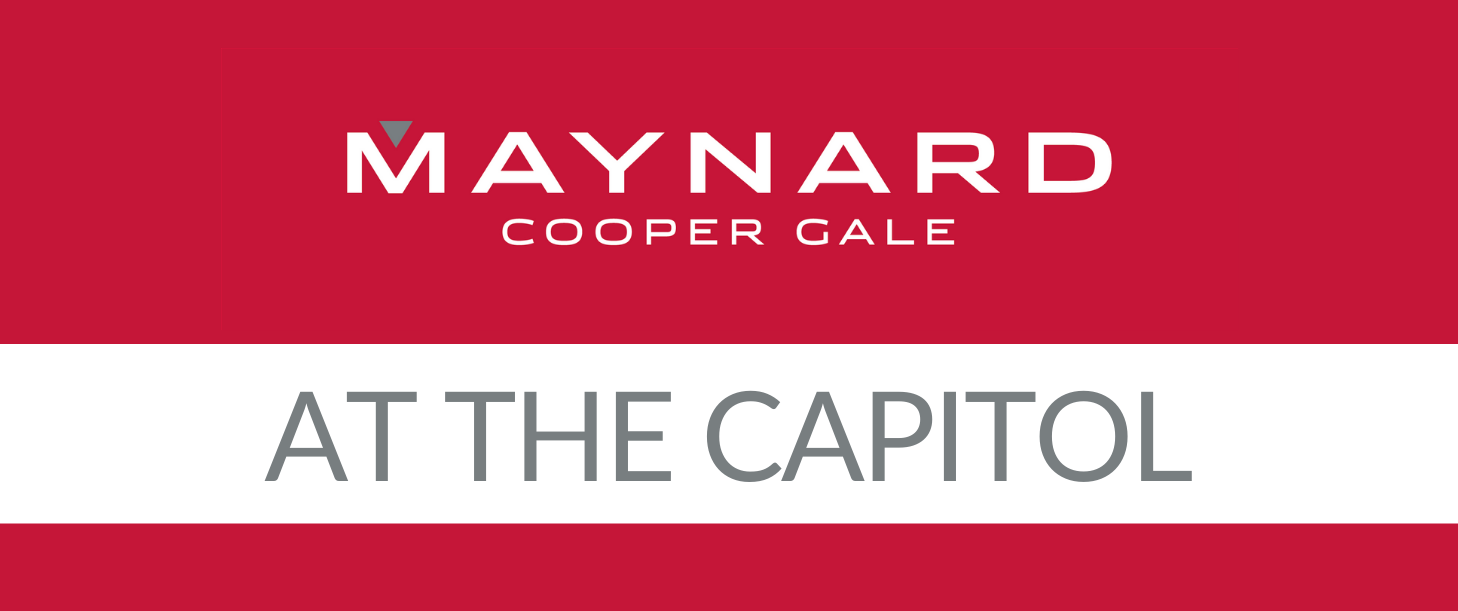2021 LEGISLATIVE UPDATE WEEK 1

Overview
The 134th Regular Session of the Alabama Legislature began at noon on Tuesday, February 2. Representatives and senators reported for duty in Montgomery amidst the coronavirus pandemic set to threaten legislative proceedings for the second year in a row. While the normal excitement of Opening Day was missing, leaders in both parties seemed resolved to push forward and take care of several critical items in the session’s first few days, an acknowledgment that legislators could be sent home at the first COVID outbreak in the State House. Members met for three legislative days this week, meaning a maximum of twenty-seven days remain (though many expect that the session will last no longer than twenty-five days). Three additional legislative days are planned for next week followed by a one-week break, during which legislative leaders will reassess their COVID protocols and sanitize the State House.
State of the State Address, Budgets
Though typically an occasion full of pomp and circumstances, Governor Kay Ivey on Tuesday night delivered the State of the State Address, her fourth, standing alone in the Capitol dome. With no breaks for applause or ovations, Ivey struck an optimistic tone during her thirty minutes of remarks, reminding Alabamians that “there is nothing we cannot achieve when we work together.” Quotes from supergroup Alabama and the iconic John Lewis provided context to the Governor’s goals for the legislative session, which include a two percent pay raise for state employees and teachers, a renewal of important economic development incentive programs, legal immunity for businesses complying with health directives, and a major investment in mental health facilities.
The next day, Ivey submitted her budget recommendations for next fiscal year, which begins October 1. Ivey’s proposed Education Trust Fund for fiscal year 2022 totals $7.65 billion, an increase of more than $440 million from the current fiscal year. Her General Fund budget totals $2.45 billion, which is a decrease of $31 million from the current year’s budget.
COVID Protocols
New safety guidelines instituted late last year by House and Senate leaders were on full display this week. Access to the State House was generally restricted to legislators and staffers only, particularly while representatives and senators were in their respective chambers. Members of the public allowed in the building were subject to temperature checks and strict social distancing protocols and were only allowed in certain areas of the building as space permitted. Consequently, most insiders were forced to follow committee and floor proceedings on their computers by streaming live video feeds from the legislature’s website. While there were some early glitches, the system worked largely as intended, a sigh of relief considering the broadcasts were coming from a building opened in 1963.
Changes in Leadership, Membership
The start of the session saw the two newest members of the legislature take their seats in the 105-member House of Representatives. On the first legislative day, Russell Bedsole, a former Alabaster City Councilman, was sworn into office by Speaker Mac McCutcheon as the representative for District 49. Bedsole fills a vacancy that was created when former Rep. April Weaver was appointed to a federal position last year. Ben Robbins, an attorney from Sylacauga, was officially seated on the third legislative day. He was elected last month to represent House District 33, a position held since 1978 by Ron Johnson, who passed away last July.
On the Senate side, a long-awaited change in power took place in the session’s opening minutes, as Sen. Del Marsh of Anniston resigned his post as the Senate President Pro Tempore. Marsh had served as the top-ranking member of the 35-member Senate since November of 2010, making him the longest-serving Pro Tem in Alabama history. He will remain a member of the Senate until his term ends in 2022 and has announced that he will not seek reelection. As expected, his resignation caused somewhat of a domino effect in the upper chamber. Senators elected the Majority Leader, Sen. Greg Reed of Jasper, as the new Pro Tem, then elected Sen. Clay Scofield of Arab as the new Majority Leader. Upon assuming that office, Scofield had to abdicate his role as Chairman of the powerful Confirmations Committee, an appointment that went to Sen. Clyde Chambliss of Prattville. Speaking of Senate committees, Sen. Tom Whatley of Auburn was named Chairman of the Judiciary Committee this week, a post previously held by Sen. Cam Ward of Alabaster, who was recently appointed Director of the Board of Pardons and Paroles by Gov. Ivey. Whatley was previously Chairman of the Senate Agriculture Committee, an office which now belongs to Sen. Larry Stutts of Sheffield.
The session begins with a single vacancy in the House and two vacancies in the Senate.
Pro-Business Priorities
Three critical pro-business pieces of legislation took center stage during the session’s first week.
- Senate Bill 30 by Sen. Arthur Orr of Decatur provides businesses, healthcare providers, churches, and other entities with civil immunity from COVID-related lawsuits, so long as the covered entities followed proper federal and state health protocols. This agreed-upon legislation was introduced late in the COVID-shortened 2020 session, and much of the language in the bill was included in an Executive Order issued last May. The legislation was at the top of everyone’s “must pass” list and was the first bill to pass the Senate this session.
- House Bill 170 by Rep. Danny Garrett of Trussville makes clear that tax credits and stimulus payments provided by the federal CARES Act are excluded from state income taxation. The legislation also includes several other important tax provisions related to business income apportionment, business expense deductibility, and pass-through taxation. It passed the House unanimously on the third legislative day.
- House Bill 192 by Rep. Bill Poole of Tuscaloosa renews and expands three important economic development incentive programs used by the state to lure companies to Alabama.
- Credits available under the Alabama Jobs Act, which expired in 2020, would be extended to 2023, with the amount of credits increasing from $300 million to $325 million in 2021 and $350 million in 2022.
- Credits available under the Growing Alabama Act, which also expired in 2020, would be extended to 2023, with the amount of credits increasing from $10 million to $20 million annually.
- Credits available under the Alabama Port Credit program would be expanded to include more creditable opportunities for automotive companies.
Each bill was introduced on the first legislative day, was reported out of committee on the second, and passed its chamber of origin on the third. Legislators plan to take up the bills next week, with the hope of having them to Gov. Ivey by the end of the week. The Governor has signaled that she would sign these bills into law “without delay.”
“Shipt”ments of Alcohol
Several bills gaining traction early in the session relate to alcohol. One in particular is Senate Bill 126, sponsored by Rules Committee Chairman Sen. Jabo Waggoner of Vestavia Hills, which would allow for certain licensees of the Alcoholic Beverage Control Board to deliver sealed beer, wine, and spirits from certain retail establishments to individuals in Alabama. The deliveries would be tightly limited in size and could only be made to adults of a legal drinking age. Though many are naturally concerned about the impact of alcohol delivery, the legislation includes multiple layers of checks and balances. In fact, if a delivery driver believes that the order is improper or unlawful, the legislation allows the driver to return the alcohol back to the point of purchase for a refund but still get paid as if the delivery was completed. This bill has been discussed for several years but rose to importance in the legislature mainly because of Shipt, the same-day delivery service headquartered in Alabama. In many ways, Senate Bill 126 and its House companion, House Bill 129 by Rep. Gil Isbell of Gadsden, models similar bills in nearly 20 other states. The Senate Tourism and Marketing Committee favorably reported the bill this week, and since the bill’s sponsor also sets the agenda for each legislative day, it is expected on the Senate floor soon.
Controversial Bills
Even with the disruptions caused by COVID, key legislators are indicating that several controversial bills will still be introduced and pushed during the session. Sen. Tim Melson of Florence reintroduced legislation allowing for the use of medical cannabis in certain circumstances, and the bill is now ready for the Senate floor. Several legislators, including Sen. Del Marsh, have announced that comprehensive gambling legislation may be introduced sooner rather than later, possibly covering topics such as a lottery, casino gambling, and sports betting. Finally, there are competing House proposals seeking to amend the Alabama Memorial Preservation Act of 2017. The bill sponsored by Rep. Mike Holmes of Wetumpka would increase fines for violating the law to $10,000 per day until the monument is restored or replaced, rather than a flat fine of $25,000 for violating the law. On the other hand, a bill sponsored by Reps. Laura Hall and Anthony Daniels of Huntsville would repeal the 2017 act altogether.
Statistics
Through three legislative days, legislators have introduced 550 bills - 351 in the House and 199 in the Senate. For context, consider that legislators introduced 856 bills during the entire 2020 session. The House and Senate return to Montgomery for the fourth legislative day on Tuesday, February 9.
This Client Alert is for information purposes only and should not be construed as legal advice. The information in this Client Alert is not intended to create and does not create an attorney-client relationship.
About Maynard Nexsen
Maynard Nexsen is a full-service law firm of 600+ attorneys in 31 locations from coast to coast across the United States. Maynard Nexsen formed in 2023 when two successful, client-centered firms combined to form a powerful national team. Maynard Nexsen’s list of clients spans a wide range of industry sectors and includes both public and private companies.








